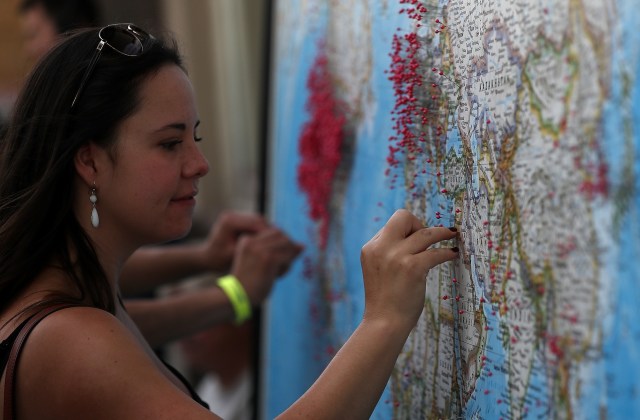Credit: Justin Sullivan / Getty

The sciences impress us, the humanities inspire us, but geography occupies an awkwardly undefined position between the two. (Oh, the irony!)
Geography is to the academic disciplines what sculpture is to the fine arts – something you trip over while gazing elsewhere.
Above all, the subject suffers by comparison to history. How many TV geographers can you name? When did you last hear someone solemnly insist that we must learn the lessons of geography? Who has ever spoken of feeling the hand of geography upon their shoulder?
One might assume that the digital age has handed a further blow to the discipline. If electronic communication has overthrown the tyranny of distance, then, surely, geography matters less than ever?
Not a bit of it. In fact, our online activities are revealing just how relevant it still is. That much is made clear in a brilliant feature for the New York Times by Emily Badger and Quoctrung Bui :
“In the millions of ties on Facebook that connect relatives, co-workers, classmates and friends, Americans are far more likely to know people nearby than in distant communities that share their politics or mirror their demographics. The dominant picture in data analyzed by economists at Facebook, Harvard, Princeton and New York University is not that like-minded places are linked; rather, people in counties close to one another are.”
The data was incorporated into an interactive ‘heat map’ of America. Users can choose any particular US county, and see the rest of the map coloured according to the likelihood of local people having a Facebook connection with the residents of the reference county:
“Even in Washington, D.C., nearly half of friendship links extend to people who live within 100 miles. Nationwide, in the average county, 63 percent of friendship links are that close, probably reflecting that many people on Facebook know one another through real-world sites like grade schools, colleges and offices. Other research shows that these sites tend to be close to home: The typical American lives just 18 miles from his or her mother. The typical student enrolls in college less than 15 miles from home.”
Though technology allows us to communicate with complete strangers anywhere in the world, we tend to use social media as an extension – or, perhaps, an attenuation – of real world relationships. Which is why geography matters. This, by the way, includes the physical geography of mountains, rivers and islands:
“Friendship links from Belmont County, Ohio, extend east but don’t cross the Appalachian Mountains in Pennsylvania or the Blue Ridge range in Virginia. In Scott County, Ark., friendships do cross state lines, into Oklahoma, Louisiana and Texas. But they don’t cross the Mississippi River to the east. In Nassau County, N.Y., the likelihood of friendship links declines steeply off Long Island.”
This is fascinating stuff and I’d love to see the same analysis done for the UK. A comparison of areas that voted for and against Brexit would be especially interesting. My guess is that geographical patterns of digital connection would be more concentrated in leave-voting areas and more dispersed in the remain-voting ones (the ‘somewheres’ versus the ‘anywheres’).
It’s tempting to say that hyper-mobile, super-connected cultural elites have forgotten the importance of place – because, as commentators like David Goodhart have pointed out, they’re not pinned down to anywhere in particular. And yet the act of leaving one’s home area to gather in global cities – and engage in an expensive struggle for space within those cities – should also be seen as a sincere, if tacit, admission of the importance of place.
But then that’s the thing about geography – you just can’t get away from it.










Join the discussion
Join like minded readers that support our journalism by becoming a paid subscriber
To join the discussion in the comments, become a paid subscriber.
Join like minded readers that support our journalism, read unlimited articles and enjoy other subscriber-only benefits.
Subscribe